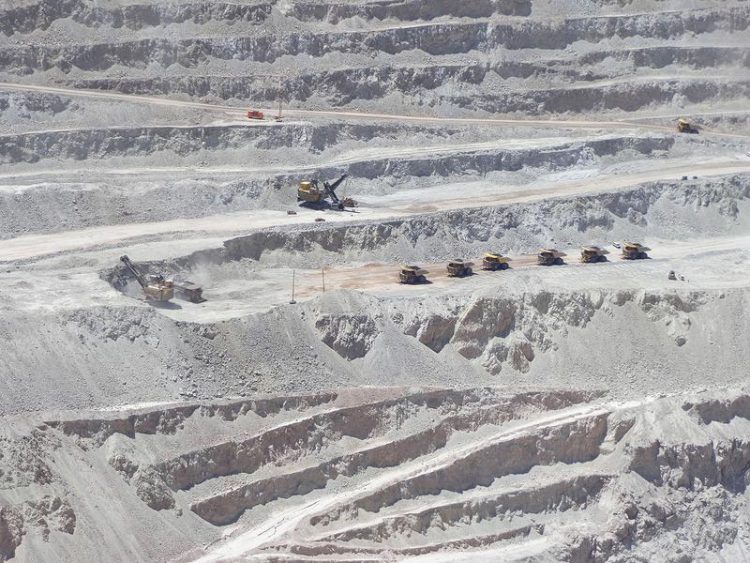New junior research group focuses on improved utilization of raw materials

Mines for Copper and Molybdenum in the North of Chile. Oldenburg University, Cascade Use
A car tire at first, in a second life maybe an insulating board or the sole of a shoe, then floor covering in a third life – if a raw material made from crude oil, which to this day remains the main constituent of car tires, is used several times and in multiple stages it is called “cascade use”.
This will be the focus of a new junior research group at the Carl von Ossietzky University Oldenburg, which is led by Dr.-Ing. Alexandra Pehlken and will commence work in the coming days.
The interdisciplinary junior research group is called “Contribution of material cascade utilization to sustainable resource management” or short “Cascade Use” and will be sponsored by the Bundesministerium für Bildung und Forschung (BMBF)’s “Global Change” programme with nearly Euro 1.4 million over a period of four years, with the possibility of adding another year if necessary.
The research group is part of the School of Computing Science, Business Administration, Economics and Law of the University of Oldenburg and consists of five co-workers. In addition to the project leader and adjunct, the group will give three doctoral students the opportunity to do research and obtain their doctorates.
One of the junior scientists is from the Shanghai Jiao Tong University. “Through our close cooperation with the Chinese university we will be able to gain valuable impulses”, Pehlken asserts. “We are going to collaborate with Professor Chen Ming, one of the most well-known Chinese recycling experts. Among other things, analyses of this exploding market in Asia will very much enhance our research. Moreover, we hope that together we can contribute to increasing the acceptance of recycling in China.”
The aim of the “Cascade Use” research is to utilize raw materials within the economic cycle for as long as possible and thus protect the environment. “This not only offers ecological benefits, but also very large and so far mostly untapped economic potentials” says Pehlken.
The group deals with the question of how materials are integrated into product life cycles and when they become available for reuse or remanufacturing.
With this issue in mind, the group develops a tool to assist decision-makers in economics, administration and politics in recognizing and evaluating the potentials for optimal resource use with the least possible environmental impacts. To do so, the scientists employ material flow analyses with reference to technological, ecological and economic aspects. Developing a method for estimating the life cycle-spanning material availability, they also, for example, determine the CO2 emissions within the recycling hierarchy.
The group particularly focuses on primary resources, such as iron, copper, aluminium and magnesium, as well as on the valuable and often critical rare earth metals. These include europium, which is needed for fluorescent lamps and plasma screens, and neodymium, which is part of the strong, small permanent magnets, high performance microphones, high-efficiency speakers, wind power turbines and high performance electric motors. Hardly any of today’s key technologies could function without the use of rare earth elements.
About Alexandra Pehlken:
Alexandra Pehlken (42) studied mining at the Rheinisch-Westfälische Technische Hochschule Aachen (RWTH Aachen) where she also gained her doctorate as engineer in 2002. The scientist, who was born in Oldenburg, has carried out research in Germany,, South Africa and China. Furthermore, a Lise-Meitner-Scholarship brought her to the ‘Natural Resources Canada’ Institute in Ottawa (Canada), where she dealt with the recycling of used car tires. Pehlken also led several research projects, for example, a project on feed production at the ‘Institute for Integrated Product Development’ (BIK) at the University of Bremen. Since 2012, the engineer has been working as a project leader in the field of energy and society at the Center for Environmental and Sustainability Research (COAST) of the University of Oldenburg. Besides, she is involved in national and international panels. In 2011, Pehlken was appointed Associated Junior Fellow at the Hanse-Wissenschaftskolleg Delmenhorst (HWK).
Contact: Dr.-Ing. Alexandra Pehlken, COAST- Center for Environmental and Sustainability Research (COAST), Tel. 0441/798-4796, E-Mail: alexandra.pehlken@uni-oldenburg.de
Media Contact
All latest news from the category: Awards Funding
Newest articles

Parallel Paths: Understanding Malaria Resistance in Chimpanzees and Humans
The closest relatives of humans adapt genetically to habitats and infections Survival of the Fittest: Genetic Adaptations Uncovered in Chimpanzees Görlitz, 10.01.2025. Chimpanzees have genetic adaptations that help them survive…

You are What You Eat—Stanford Study Links Fiber to Anti-Cancer Gene Modulation
The Fiber Gap: A Growing Concern in American Diets Fiber is well known to be an important part of a healthy diet, yet less than 10% of Americans eat the minimum recommended…

Trust Your Gut—RNA-Protein Discovery for Better Immunity
HIRI researchers uncover control mechanisms of polysaccharide utilization in Bacteroides thetaiotaomicron. Researchers at the Helmholtz Institute for RNA-based Infection Research (HIRI) and the Julius-Maximilians-Universität (JMU) in Würzburg have identified a…



